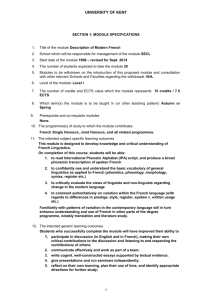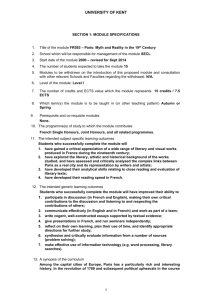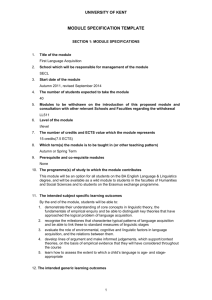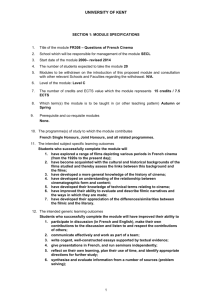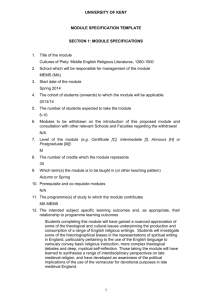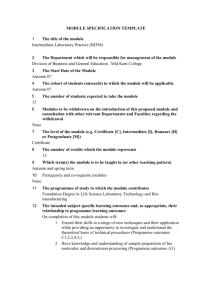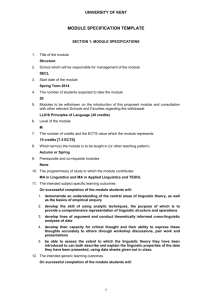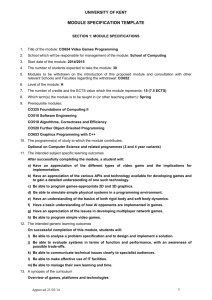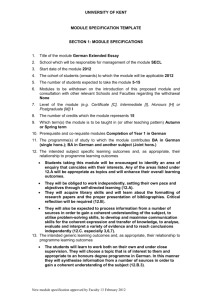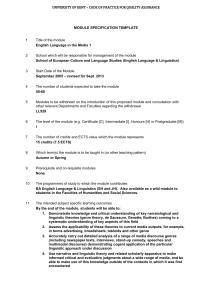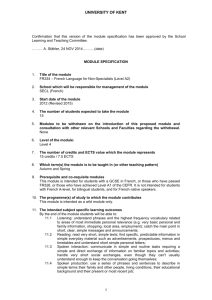FR615 - University of Kent
advertisement
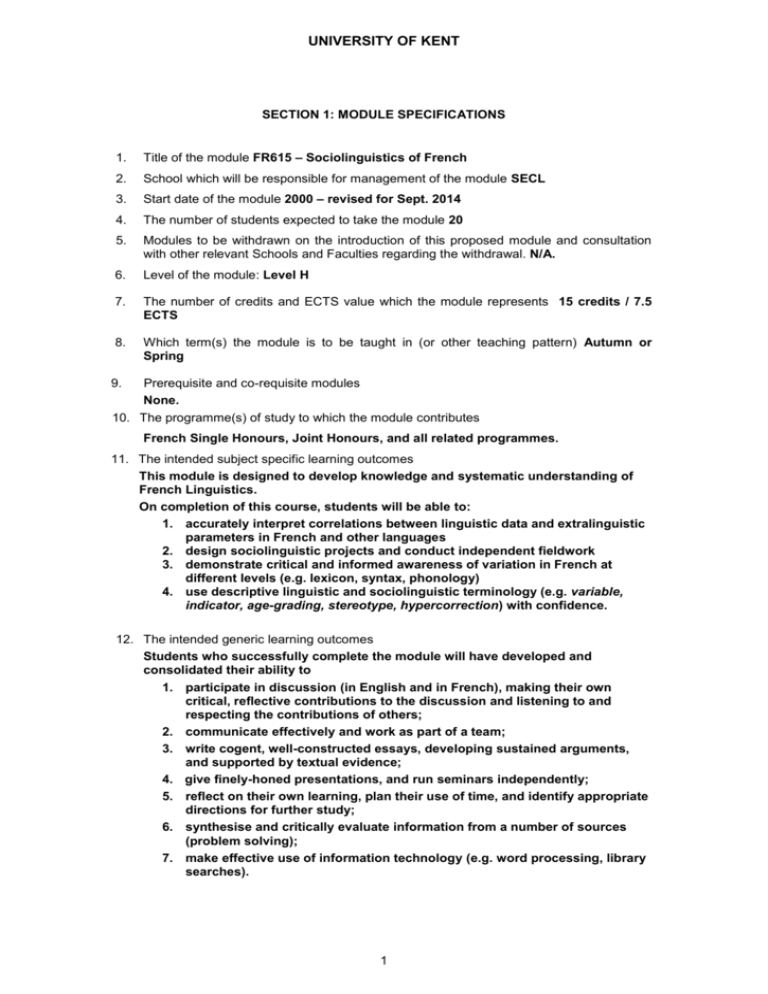
UNIVERSITY OF KENT SECTION 1: MODULE SPECIFICATIONS 1. Title of the module FR615 – Sociolinguistics of French 2. School which will be responsible for management of the module SECL 3. Start date of the module 2000 – revised for Sept. 2014 4. The number of students expected to take the module 20 5. Modules to be withdrawn on the introduction of this proposed module and consultation with other relevant Schools and Faculties regarding the withdrawal. N/A. 6. Level of the module: Level H 7. The number of credits and ECTS value which the module represents 15 credits / 7.5 ECTS 8. Which term(s) the module is to be taught in (or other teaching pattern) Autumn or Spring 9. Prerequisite and co-requisite modules None. 10. The programme(s) of study to which the module contributes French Single Honours, Joint Honours, and all related programmes. 11. The intended subject specific learning outcomes This module is designed to develop knowledge and systematic understanding of French Linguistics. On completion of this course, students will be able to: 1. accurately interpret correlations between linguistic data and extralinguistic parameters in French and other languages 2. design sociolinguistic projects and conduct independent fieldwork 3. demonstrate critical and informed awareness of variation in French at different levels (e.g. lexicon, syntax, phonology) 4. use descriptive linguistic and sociolinguistic terminology (e.g. variable, indicator, age-grading, stereotype, hypercorrection) with confidence. 12. The intended generic learning outcomes Students who successfully complete the module will have developed and consolidated their ability to 1. participate in discussion (in English and in French), making their own critical, reflective contributions to the discussion and listening to and respecting the contributions of others; 2. communicate effectively and work as part of a team; 3. write cogent, well-constructed essays, developing sustained arguments, and supported by textual evidence; 4. give finely-honed presentations, and run seminars independently; 5. reflect on their own learning, plan their use of time, and identify appropriate directions for further study; 6. synthesise and critically evaluate information from a number of sources (problem solving); 7. make effective use of information technology (e.g. word processing, library searches). 1 UNIVERSITY OF KENT 13. A synopsis of the curriculum This module is designed to make students aware of varieties of modern French other than the standard language. It will focus on issues associated with linguistic inequality and encourage students to investigate variation in contemporary French for themselves. There can be few countries where linguistic prescriptivism is as deep-rooted as it is in France. The Académie française pronounces on le bon usage, while the education system is hostile to regional varieties. To focus exclusively on standard French, however, is to ignore a rich diversity of language at a number of levels. This module will attempt to redress the balance by considering such issues as regional and socio-situational variation within modern French, as well as variation according to sex, class, or age. Other issues to be considered will be the relationship between français régional and dialect, the role of franglais, language policy and attitudes, and the position of French outside France. A background in Linguistics will not be assumed. 14. Indicative Reading List Armstrong, N. (2001) Social and Stylistic Variation in Spoken French: A comparative Approach. Amsterdam: John Benjamins. Ball, R. (1997) The French-Speaking World: a practical introduction to sociolinguistic issues. Routledge. Battye, A. & Hintze, M-A & Rowlett, P. (2000). The French Language Today. London: Routledge. Walter, H. (1994) French Inside and Out. London: Routledge. Wardhaugh, R. (1998) An Introduction to Sociolinguistics. 15. Learning and Teaching Methods, including the nature and number of contact hours and the total study hours which will be expected of students, and how these relate to achievement of the intended learning outcomes One weekly two-hour seminar for 10 weeks, for which discussion topics are set in advance. Total Contact Hours: 20 Total Study Hours: 150 Student commitments to this module will be approximately ten hours per week, two contact hours in the classroom and eight hours of study and preparation (generic learning outcomes 3, 5, 6, 7). After the first week, students will be divided into presentation groups of 2-3 and expected to give at least one presentation on a topic listed in the module programme. Each group will also be required to lead questioning on at least one other presentation. It is essential that the ‘questioning’ group read the short item assigned to them, which is designed to facilitate wider discussion after the presentation has been completed. Additional material may also be provided via Moodle. (Subject-specific learning outcomes 1-4; generic learning outcomes 1, 2, 4, 6). 16. Assessment methods and how these relate to testing achievement of the intended learning outcomes The final mark for the module will be based on the following elements: If the module runs in the Autumn term: Linguistic Commentary (500 words): 20% Essay (in English or in French – 2700 words): 60% Oral presentation: 20% 2 UNIVERSITY OF KENT If the module runs in the Spring term: Essay (in English or in French – 2250 words): 40% Oral presentation: 20% Examination (summer term – 2 hours): 40% If the module runs in the Autumn term, the Linguistic Commentary will be a short summary based on topics explored in the first half of the module, and requiring students to demonstrate understanding of key linguistic themes underpinning the module as a whole. One-to-one feedback will be provided, which will inform the Essay, to be submitted later in the term. If the module runs in the Spring term, feedback on the essay will be provided well in advance of the exam. The mark for the seminar presentation will be awarded for a group presentation during the term. In the event of a group or individual being asked to perform more than one presentation, the higher of the two marks awarded will count. A bonus mark may be added to the seminar presentation mark of individual students whose contribution throughout the term (e.g. in leading questioning after presentations) is exceptional. Written work tests achievements of subject-specific learning outcomes 1-4 and generic learning outcomes 3, 5, 6, 7. Oral work tests achievement of subjectspecific learning outcomes 1-4 and generic learning outcomes 1, 2, 4, 6. If the module runs in the Autumn term, the module will be 100% coursework. If the module runs in the Spring term, the examination will take place in the Summer term. 17. Implications for learning resources, including staff, library, IT and space None. 18. The School recognises and has embedded the expectations of current disability equality legislation, and supports students with a declared disability or special educational need in its teaching. Within this module we will make reasonable adjustments wherever necessary, including additional or substitute materials, teaching modes or assessment methods for students who have declared and discussed their learning support needs. Arrangements for students with declared disabilities will be made on an individual basis, in consultation with the University’s Student Support and Welfare service, and specialist support will be provided where needed. 19. Campus(es) where module will be delivered: Canterbury SECTION 2: MODULE IS PART OF A PROGRAMME OF STUDY IN A UNIVERSITY SCHOOL Statement by the School Director of Learning and Teaching/School Director of Graduate Studies (as appropriate): "I confirm I have been consulted on the above module proposal and have given advice on the correct procedures and required content of module proposals" ................................................................ .............................................. Director of Learning and Teaching/Director of Graduate Date 3 UNIVERSITY OF KENT Studies (delete as applicable) ………………………………………………… Print Name Statement by the Head of School: "I confirm that the School has approved the introduction of the module and, where the module is proposed by School staff, will be responsible for its resourcing" ................................................................. .............................................. Head of School Date ……………………………………………………. Print Name SECTION 3: MODULE IS PART OF A PROGRAMME IN A PARTNER COLLEGE OR VALIDATED INSTITUTION (Where the module is proposed by a Partner College/Validated Institution) Statement by the Nominated Officer of the College/Validated Institution (delete as applicable): "I confirm that the College/Validated Institution (delete as applicable) has approved the introduction of the module and will be responsible for its resourcing" ................................................................. Nominated Responsible Officer College/Validated Institution of .............................................. Partner …………………………………………………. Print Name ………………………………………………….. Post …………………………………………. Partner College/Validated Institution Module Specification Template Last updated January 2013 4 Date
